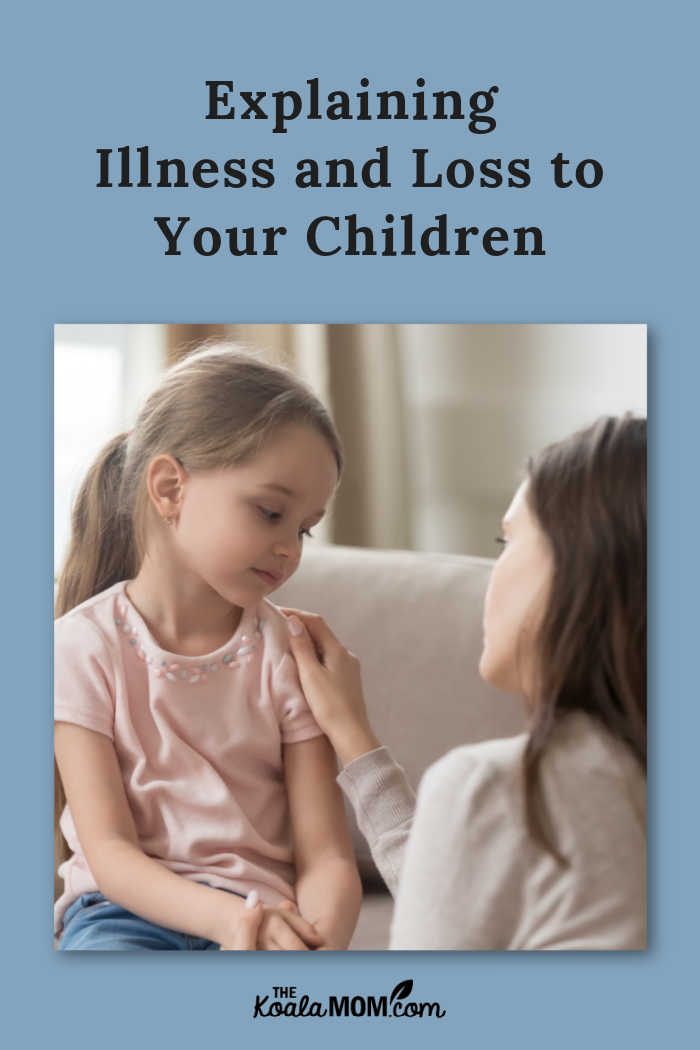As an adult, it can be hard to cope with the illness and subsequent loss of a loved one. For a child who has never had to deal with loss before, it’s often scary and confusing. You may feel that your child is too young to understand why their grandparent or another relative is no longer how they remember them. Still, there is a way to explain it in terms they can understand.

The Importance of Explaining Illness and Loss to Children
Children may not entirely understand a grandparent’s illness or why they are going into a care facility for a full range of hospice services. During one visit to my grandma when her dementia was well-advanced, she asked us every five minutes or so if we’d been skiing. I tried to find creative ways to answer her question, but Sunshine later asked me why Grandma kept asking the same question over and over again. Later, my grandma’s dementia progressed to the point where she didn’t even talk to us. She just stared when we visited her care facility. Again, it was hard to explain to the girls why Grandma didn’t respond.
However, what children will realize is that you’re not fully present. Sadness and exhaustion may be pulling your attention from them, and they understand enough to know that something isn’t right. By giving your children enough information, they have space to work through their feelings, be included rather than feeling isolated, and trust in you to tell them the facts. I talked with my kids about how Grandma had a brain disease that was progressing, and shared memories with them of happier days. I also talked about how we loved her and maybe she could still hear us, even if she couldn’t respond to us. And I tried to keep our visits short, or to let them bring colouring or electronics to play on, so they weren’t overwhelmed by the visit.
Time It Right
There will never be a right time to tell a child their family member is unwell and won’t be getting better. However, planning for the conversation can ensure you’re as ready as you can be to deal with the situation and your child’s feelings. Think about when your child is the most attentive, and avoid doing it close to bedtime or when they’re feeling tired. Consider the best words to use to help them understand and pay attention to your body language and tone.
When my uncle passed away suddenly from a heart attack, it took me several days to talk to my kids about it. I needed some time to grieve and process myself before explaining to them. I ended up telling one daughter while we driving home from a music lesson, and then telling the others over dinner that night. Decide whether to tell your kids one at a time or to tell them all together. Their personalities and how close they each were to the family member might help you decide how they’d best receive the news.
Explain It Simply
Even if your children don’t see their ill family member very often, it’s a good idea to offer the full picture, but in simple terms. You may like to tell them the name of the illness or disease, what they have planned for the ill family member (such as a care home), and what your family is doing to help. Don’t forget to ask them if they have any questions, but be prepared for more as your loved one’s illness progresses.
Provide Support
When your parent or family member becomes ill, your time can be torn between caring for them and making sure you meet your children’s needs. At this time, focus on the quality of your time rather than the quantity. Use the moments you do share with your children to acknowledge their feelings, keep their routines, do fun activities, and open the door for communication about how they are feeling. As much as your family member’s illness is tough on you, it’s tough on them, too.
When Explaining Death
If a family member has passed away after suffering from an illness, tell your children as soon as possible. Be direct, so there is no room for misinterpretation, but don’t forget to use a calming tone of voice. Use simple words to explain the situation, such as “Our family has some sad news today. Your granddad died today.” Give them time to be sad, and try to answer any questions they may have to the best of your ability.
Moving a loved one into a hospice care facility can be heart-breaking. While you’re experiencing a range of emotions, so are your children. When you’re ready, start planning how to support both yourself and your children through this sad time.

No Responses Yet